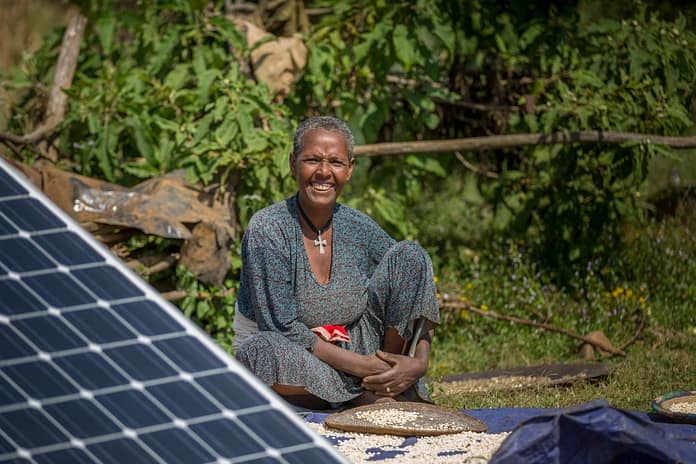By Julius Aseye Nornoo, Charity Osei-Amponsah, William Quarmine, Sandra Hyde and Andrew Okem
Many communities in rural Africa are experiencing the effects of the climate crisis, including dry spells and severe water scarcity leading to low crop productivity and livestock mortality. The situation is worsened by the lack of strategies to address climate change that could support their agricultural livelihoods and reduce poverty. Against this backdrop, there is the need to understand the challenges posed by climate change in rural communities, and how the implementation of socio-economic interventions can drive social transformation and build resilience. The International Water Management Institute, through its EU-funded Resilience Against Climate Change-Social Transformation Reasearch and Policy Advocacy project, provides insights into the drivers of social transformation and climate resilience in rural communities, as evidence for further development action.
Here we focus on three interventions—the Kulun-Yanyuoyiri bridge, the REACH Conservation Agriculture Project, and the Market-Oriented Agriculture Program in the Upper West Region of Ghana—to understand how rural development interventions can promote resilience building in a climate vulnerability hotspot and enhance societal transformation. A mixed methods approach comprising community surveys, focus group discussions, life histories and key informant interviews was used to collect and analyze data to understand the transformations arising from the development interventions.

Kulun–Yanyuoyiri Bridge
Life in the two communities of Kulun and Yanyuoyiri was challenging before the construction of the Kulun-Yanyuoyiri bridge. The only means of crossing the river, prior to its construction, was by canoes which were unreliable and unsafe with many deaths resulting from capsized boats. Access to the market was limited and farm holdings were small as tractors could not cross the river to plough larger holdings. Access to education was also limited for children. Women were burdened with the additional belief that crossing the river via canoe while menstruating could bring about mishaps.
With the construction of the bridge, children could easily attend school in the neighboring communities. It also improved access to the market as indicated by 65% of respondents in a survey. However, the bridge is restricting the free flow of water, which may lead to flooding during heavy rainfall. These findings have helped us to gain better insights into the negative and positive consequences of development intervention on social transformation, which have been incorporated into knowledge products for strengthening the capacity of development planners in designing transformative interventions.
REACH Conservation Agriculture Project

Conservation agriculture (CA) was introduced in Janguasi as part of activities under the European Union Ghana Agricultural Program. It resulted in the reduction of unsustainable agricultural practices, such bush burning, empowerment of rural women, through enhanced access to improved seeds and organic fertilizer, and the improvement in crop yields and incomes. A farmer explained “There is an increase in my farm income, which contributes to reducing my poverty level.”
The profound impact of this intervention is manifest in the remarkable reduction in food shortages linked to the substantial improvement in crop yields and shifting gender dynamics within farming, signified by increased female engagement in agricultural activities. As mentioned by one woman, “We now have more food to manage ourselves, unavailability of food has reduced because crop yields have improved.”
Market-Oriented Agriculture Program

In Chapuri, the off-taker model, which provides a direct buyer who supplies the farmers with inputs and buys their crops at harvest time, transformed agricultural trading pathways, mitigating challenges confronting farmers, especially women. Farmers’ only trading options prior to the project’s launch were based around weekly spot markets or aggregators. A sorghum farmer revealed, “At the time those that bring the fertilizer would come back to buy from you and deduct their fertilizer money from your sales.”
As a testament to positive change, a satisfied interviewee shared, “One thing I will say is that what is beneficial to us in the use of the model is that I don’t have to struggle to carry my sorghum to the market. They come to buy the sorghum and pay the money in bulk to us instead of us selling it in bits as we used to do.”
Structural transformations were striking, with a 98.6% consensus on the diminishing prevalence of inefficient approaches to marketing farm produce. Beyond agricultural realms, the project improved safe water accessibility thereby mitigating health risks within the community, positively shifted gender roles by supporting more women to participate in the production and marketing of their crops, and household incomes.
Implications for sustainable positive societal transformation
Evidence from the implementation of the three interventions points to the transformative effects rural development initiatives can have on communities. Apart from the initiatives themselves being beneficial, their implementation triggers other important society-wide changes, creating positive outcomes such as enhanced resilience of households against the negative impact of climate change.
Policymakers, development practitioners, and communities must try to comprehensively understand the transforming social contexts in which interventions will be implemented. This project, for instance, has incorporated the insights from the study into its learning event outline for development officers in the Upper West Region. The aim is to build their capacity and support them to carry out social transformation analysis to understand how the implementation of development interventions may slow down negative changes and promote sustained positive transformation. The insights will also ensure inclusive community engagement in decision-making, implementation, monitoring and evaluation.



